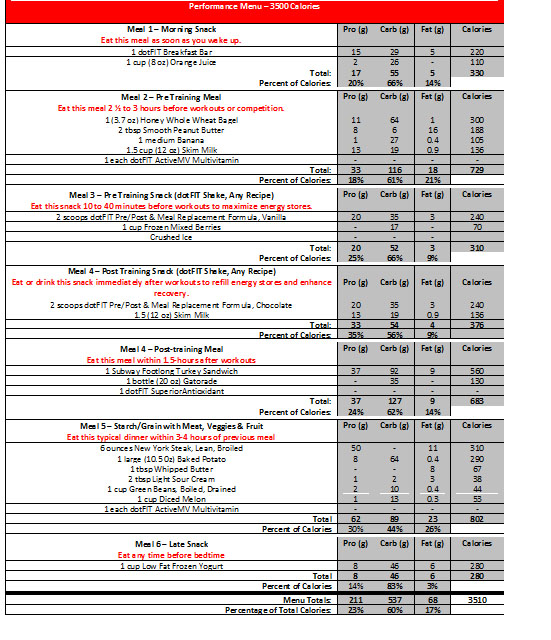The menu below is specifically designed to help you reach your weight gain goals while maximizing performance. Here’s how the plan works:
- Your target daily calories are slightly higher than your daily burn. This allows males to gain up to one-half pound per week and females up to one-quarter pound per week. Children and growing teens may gain more.
- If you do not gain weight steadily, add 100 to 250 calories (based on your size) to your daily total. These calories should come from equal amounts of carbohydrate, protein and moderate amounts fat.
- If you do not gain weight after one week of eating additional calories, add another 100 to 250 calories per day.
- smartsnacks.FIT foods were formulated to meet the ideal amounts of nutrients and calories and are convenient pre- and post-training meals.
- In most cases, some form of resistance training is needed to create a stimulus for gaining muscle instead of body fat.
Menu Instructions
Using the menu below, arrange your meals around your training schedule. Space your meals no more than three to four hours apart. Other than your pre- and post-training meals and snacks, you may eat the remaining meals in any order that fits your lifestyle or venue.
- Large pre-training meal - This is an example of what your pre-workout or event meal should contain. Eat this meal approximately 2 ½ to 3 hours before the start an event or workouts.
- Pre-training snack – Eat this snack 10-40 minutes before activity to ensure your energy stores are topped off. Liquid snacks are ideal because they are rapidly digested, but you can substitute with any smartsnacks.FIT food as long as you match the calories and the food meets the necessary “quick digestion” criteria.
- Post-training snack – Eat or drink this snack immediately following activity to maximize recovery. Shakes are ideal but you can choose another item with the same calories.
- Post-training meal – Have this meal within two hours after your workout or event.
- Early morning training – If you do not have time for complete digestion of a large meal, consume only the pre-training snack. Your final meal of each day should be similar to the pre-training meal. This helps fill your energy stores as much as possible before bedtime and limits the amount of energy that is depleted before your morning workouts.
- Substitutions – Each meal has ideal amounts of carbohydrate, protein and fat based on your goals. Any food or meal can be substituted for another but be sure to keep the calories and grams of carbohydrate, protein and fat as close as possible.
